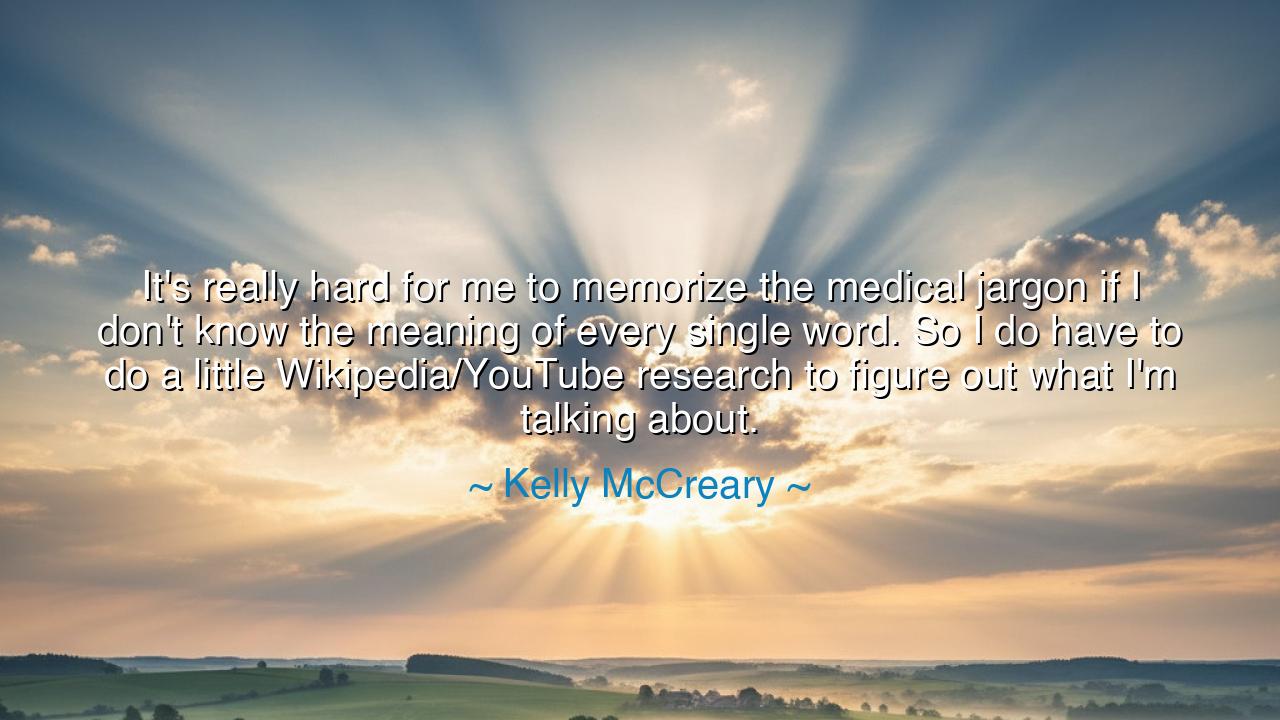
It's really hard for me to memorize the medical jargon if I don't
It's really hard for me to memorize the medical jargon if I don't know the meaning of every single word. So I do have to do a little Wikipedia/YouTube research to figure out what I'm talking about.






Hear, O seekers of wisdom, the words of Kelly McCreary, who confessed with honesty and humility: “It’s really hard for me to memorize the medical jargon if I don’t know the meaning of every single word. So I do have to do a little Wikipedia/YouTube research to figure out what I’m talking about.” In these words is revealed not weakness, but strength—the strength of one who understands that true knowledge is not the shallow memorization of sounds, but the deep grasp of meaning. For words without meaning are like stones without mortar: they pile high, yet they crumble at the first touch.
The meaning of this teaching lies in the eternal struggle between rote learning and true understanding. Many fill their minds with endless jargon, terms repeated like chants, yet never planted in the soil of comprehension. McCreary declares the higher path: to study until the meaning of every word is known, to seek clarity before repetition, to anchor knowledge not in the lips but in the heart. This is not merely the method of actors preparing for roles—it is the way of all true learners in every age.
Consider, my children, the tale of Hippocrates, the ancient physician, who taught his students not merely to memorize remedies, but to understand the nature of the body itself. He did not command them to chant lists of herbs and procedures; instead, he urged them to observe, to reason, to connect cause and effect. Those who memorized only words soon forgot them; those who grasped the meaning healed nations and left wisdom that endures for centuries. So too, McCreary’s practice of deeper research mirrors the ancient method: understanding first, then mastery.
The origin of her struggle lies in the nature of her craft. As an actress portraying healers, she is surrounded by a world of medical language—syllables strange and intimidating, woven together like spells. Yet rather than surrender to shallow imitation, she turns to learning itself, using tools at her disposal—research, exploration, and curiosity—to make the words live within her. She reveals the noble truth that no task, however foreign, can be mastered without first bowing before the altar of understanding.
Let us not mistake her words as mere confession of difficulty. No—they are a proclamation of wisdom. For in every discipline—medicine, law, art, or science—the temptation is great to memorize without thought, to imitate without comprehension. But such learning is fragile and easily broken. Only by seeking the root, the essence, the meaning of every word, can one truly build knowledge that endures. To research, to question, to dig deeper—this is the mark of the true student, and of the master yet to come.
The lesson for us is radiant: never be content with shallow repetition. Do not fear the labor of seeking meaning. For the effort to understand transforms mere words into living knowledge. As fire refines metal, so study and research refine the mind. Even when the path is difficult, when the terms are foreign, and the subject vast, the one who perseveres in seeking meaning will always surpass the one who memorizes blindly.
Practical actions lie open before you: when faced with new knowledge, do not simply copy it into memory—pause, question, and break it into pieces until each fragment is clear. Use every resource available—books, teachers, even the modern scrolls of —not as shortcuts, but as lamps to light the dark path. Teach your children and students not to parrot words, but to wrestle with them, to make them their own. For the one who understands deeply can adapt, recall, and create, while the one who memorizes without meaning is like a reed that bends in every wind.
Thus, O heirs of wisdom, remember McCreary’s counsel: true learning begins not with memory, but with meaning. Seek understanding before repetition, knowledge before performance. For in knowing deeply, you will not only remember—you will embody. And when you embody knowledge, it becomes a part of you, unshakable, enduring, and powerful, able to shape your life and the world around you. Understand, and you shall truly know.






AAdministratorAdministrator
Welcome, honored guests. Please leave a comment, we will respond soon